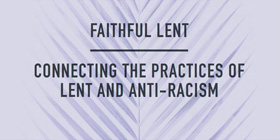Key points:
- Truth-telling, repentance, confession, recompense and renewal are essential Lenten practices and central to the Christian faith.
- As a season for atonement and holiness, Lent is a perfect time for addressing the sin of racism.
- The United Methodist Commission on Religion and Race is inviting all Christians to confront racism as a Lenten practice.

Photo courtesy of the author.
Commentaries
What if every white Christian made a personal commitment during Lent to repent of, confront, and undo racism?
We could literally change the whole world for the better.
Lent, the 40 days between Ash Wednesday (March 2) and Easter (April 17), is the sacred time during which we followers of Jesus Christ are called to study Scripture, give to people in poverty and those on society’s margins, demonstrate repentance of sin and rededicate ourselves to the work of holiness.
The United Methodist Commission on Religion and Race invites all Christians to use our Lenten 2022 study, “Faithful Lent: Connecting the Practices of Lent and Anti-Racism.” The six-part study for small groups invites followers of Jesus Christ, particularly white Christians, to engage the ancient traditions of Lent to confront and defeat a generations-old plague that has defiled church and society. Each session guides participants in this season’s sacred journey through the lens of confronting racism.
When it comes to confronting racism, this is a tough season for white Christians to engage in Lenten-like truth-telling, repentance and reparations. This is a strange season in our church and world. A number of white-led public-school boards, college and university faculty, parents, and white church laity and clergy have rebelled against teaching, assigning books on, or even talking about the legacy of racial injustice in our nation. They argue that such teaching threatens to make young people — that is, white young people — feel ashamed of their white heritage.
But truth-telling, repentance, confession, recompense and renewal are central to our Christian faith. Rather than fostering guilt, “Faithful Lent” seeks to engage and restore to white Christians truth-telling and power to make racism, racial segregation and inequality a thing of the past.
In his book “White Too Long,” writer Robert Jones — who was reared in a white Southern Baptist church home — explores the legacy of racism in Christian churches. He says his own lifelong journey of coming to terms with his racist lineage has made him feel more empowered and capable of confronting it.
Jones rejects the idea that discomfort for white people is bad and destructive. In a recent article in Religion News Service, he said, “The discomfort didn’t make me feel bad for being white; it gave me the critical distance that enabled me to continue freeing myself from the power whiteness has held over my family for generations.
“If we white Christians can muster the courage to walk in its company, discomfort with our racial history can be a sacred and saving gift,” Jones added.
Purchase Lenten study

To download “Faithful Lent: Connecting the Practices of Lent and Anti-Racism,” click here.
Please note there is a price for downloading based on church size as listed on the landing page.
The legacy of racial injustice in the church and around the world has cost the lives of many of God’s people and has undermined the credibility and impact of our Christian witness. We are still a church and a world undone by racism, as evidenced by the theft of indigenous people’s land, natural resources and wealth in the name of colonialism; the enslavement of African people with the church’s support; the ongoing inequity still found in education, criminal justice, economics and health care; and the racial violence against immigrants and Asian and Pacific Islander Americans.
However, Christians have the power to face this legacy, learn from it and move toward a more excellent future. That is the purpose of the “Faithful Lent” study for small groups. Join the United Methodist Commission on Religion and Race this Lenten season as we take prayerful, deliberate and tangible steps to end racism in our church and society.
Burton, a United Methodist deaconess, is the director of resource development for the United Methodist Commission on Religion and Race. She has more than 30 years of experience as a writer, editor, producer and trainer around issues of intercultural competency, racial justice and gender justice. She is also committed to helping the church engage and nurture children, youth and young adults as positive and powerful change agents for the cause of Jesus Christ.
News contact: Tim Tanton or Joey Butler at (615) 742-5470 or newsdesk@umcom.org. To read more United Methodist news, subscribe to the free Daily or Friday Digests.



